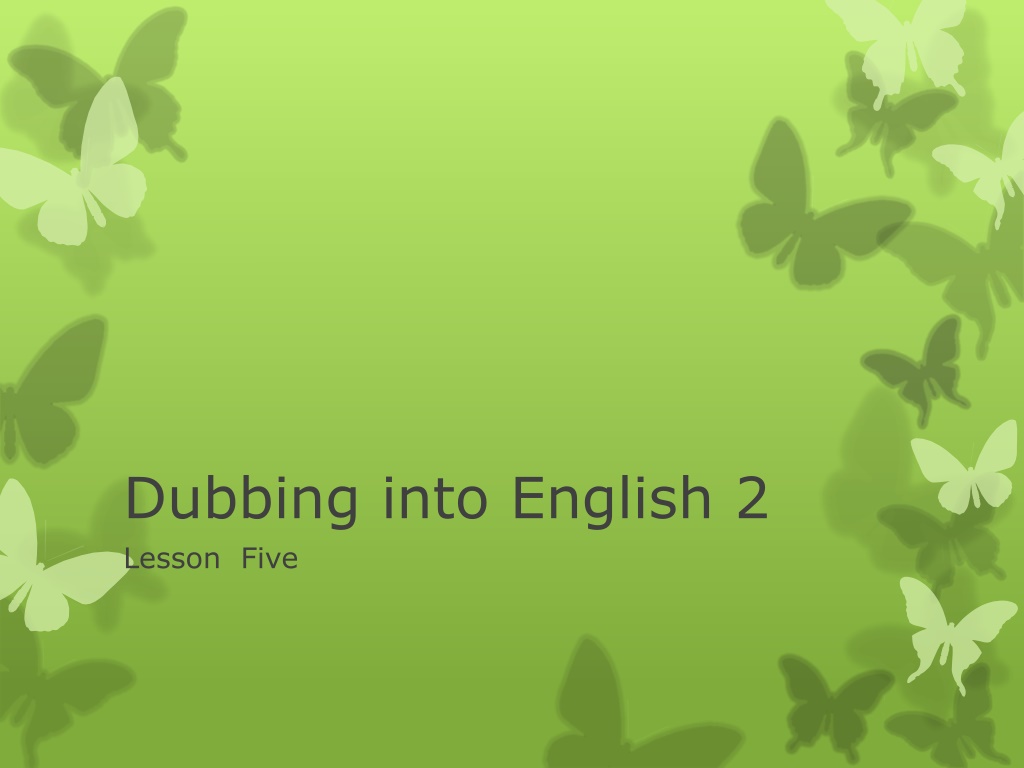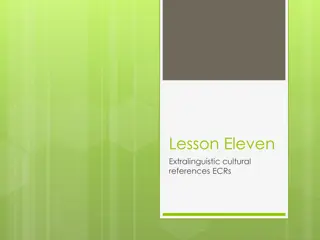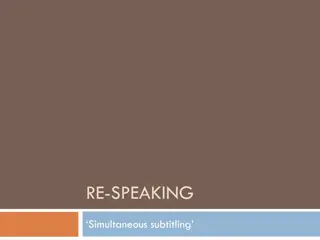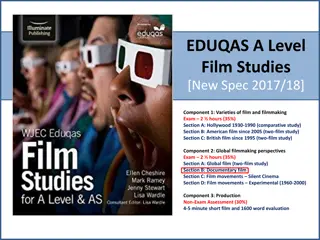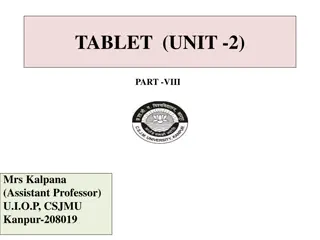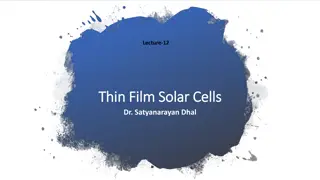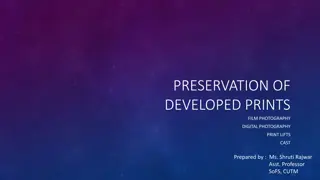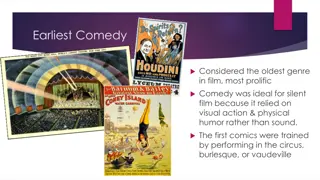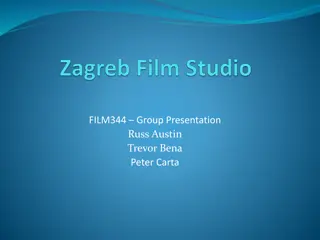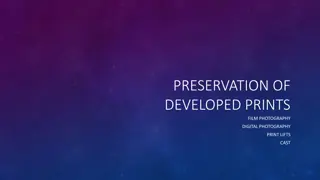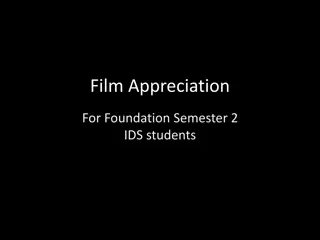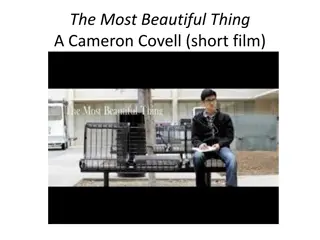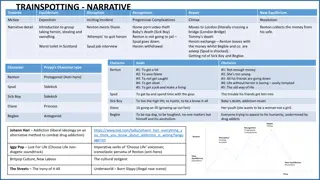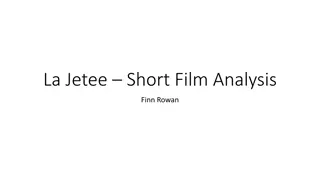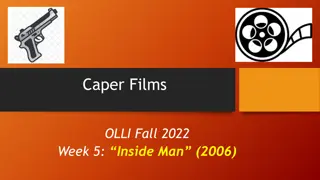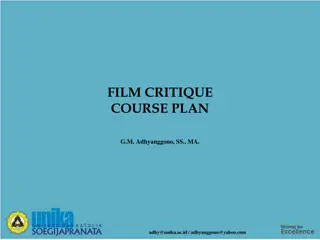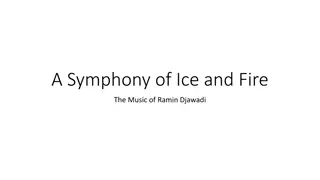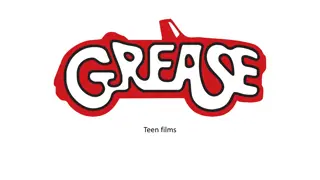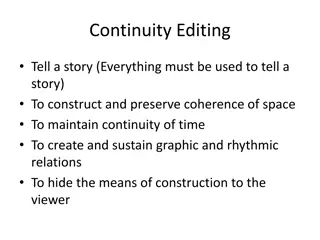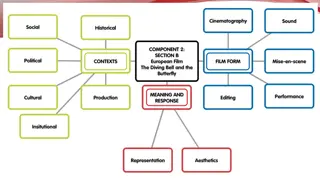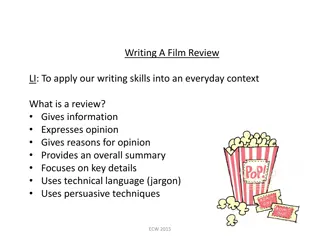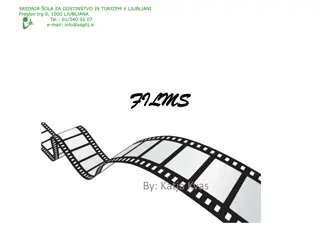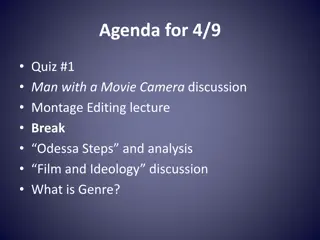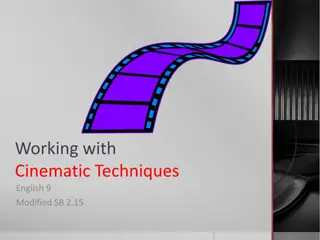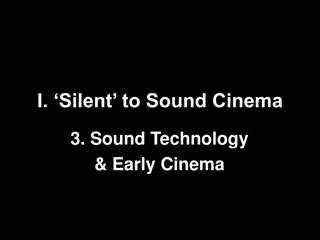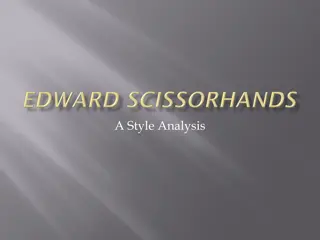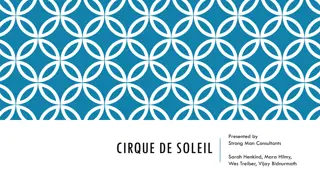Evolution of Dubbing and Subtitling Techniques in Film Industry
The evolution of dubbing and subtitling in the film industry has been a dynamic process, with different countries developing expertise in their respective methods. While Hollywood's dominance reduced the need for translation in English-speaking countries, certain prestigious foreign films are subtitled in English. The preferences for dubbing or subtitling vary among audiences, reflecting cultural habits and viewing experiences. The debate on translation strategies continues to shape the film industry's approach to reaching global audiences.
Download Presentation

Please find below an Image/Link to download the presentation.
The content on the website is provided AS IS for your information and personal use only. It may not be sold, licensed, or shared on other websites without obtaining consent from the author. Download presentation by click this link. If you encounter any issues during the download, it is possible that the publisher has removed the file from their server.
E N D
Presentation Transcript
Dubbing into English 2 Lesson Five
The Clash of Wolves (1925) (intertitles)
Talkies (need for new method)
Subtitling and Dubbing countries The subtitling countries (Scandinavia, Holland, Belgium, etc.) and the dubbing countries (Italy, Spain, Germany, France, etc.) became particularly adept at their respective methods and today the level of expertise and professionalism in these sectors is often very high.
In England, the USA, etc. In the English-speaking world, given that the majority of commercially successful films were and are still made in Hollywood, there was less of a need for any translation strategy.
What is translated? The relatively small number of films that are translated into English, typically films of a certain prestige (Fellini, Fassbinder, Bunuel, Truffaut, etc.), are subtitled. Even the currently popular Italian TV series Commissario Montalbano is subtitled on television. Things are slowly changing in the digital era but this is still largely the case.
? Now, it has always been thought and taken for granted that English-speaking audiences were happy with this situation. Either the people never watched foreign films or saw what few there were in subtitled versions.
However this has never actually been tested. Nobody has ever asked the English-speaking world whether they might prefer dubbing.
Certainly old habits die hard and Italian audiences, for example, would almost unanimously say they prefer dubbing (perhaps with the exception of language students and cinephiles) and Scandinavians would say they prefer subtitling.
And A Latvian colleague wrote that in those eastern European countries where voiceover is the most used system, they too would be reluctant to change.
Real Life Conversation The conversational behaviours of (the) participants express dimensions of their social identities. As they take turns at talking, (the) conversationalists are enacting who they are.
Film dialogue characters can be rendered more individual and realistic when defined by language, their actions and gestures are shaped by words and what is being said becomes more central than what is being seen (Vass 2006).
Screenplay writing The art of screenplay writing then dubbed Slick but unnatural Rough but natural Eg. The West Wing Eg. Ken Loach
The West Wing JOSH As you can see I have not yet bought your Christmas present. DONNA Yes, and I know you're agonizing over how to best express your appreciation and affection for me at this time of the year. JOSH That and how I scrape together the ten bucks. DONNA I've prepared a list. [She gives him a small piece of paper as they continue to walk.] JOSH Of Christmas gift suggestions? DONNA Yes. JOSH [reads] 'Ski pants, ski boots, ski hat, ski goggles, ski gloves, ski poles.' I'm assuming you already have skis? DONNA Page two. JOSH Right. DONNA Just pick something off the list, and, you know, feel free to pick two things. JOSH I should feel that freedom? DONN Yeah.
Ken Loach Raining Stones What s up? Nuthin. What yer snappin at me fo? I told yer last nigh it was gonna be summat li tha. What is wrong with you? I ve had the van nicked.
The dubbed versions? Series of constraints Lip synchronisation Supralinguistic elements (eg, body language) Timing Corrrdination with visual (multimodal text)
Experiment So, as in England exposure to foreign films is more limited, we thought it would be interesting to subject an audience to a dubbed film and see what the reception was.
Tutto brilla The film Tutto Brilla is well dubbed by a professional working in Italy (Gregory Snegoff), who both translated and acted/dubbed the main role.
Casa del Cinema Mario Paolinelli and Eleonora Di Fortunato, established film translators in Italy and members of AIDAC, organised, at The Casa del Cinema in Rome the viewing of two Italian products, Bbobbolone (Daniele Cascella, 2003, Italy) and Tutto brilla (Massimo Cappelli, 2005, Italy)[1], both dubbed into English by a team headed by Gregory Snegoff.
Gregory Snegoff Various dignitaries from the world of politics and film distribution were invited to the showing in an attempt to convince them of the value of marketing dubbed products in the English-speaking world. They didn t turn up!!!
Tutto Brilla ..illustrates the empty lives of three middle-class, middle-aged women in northern Italy, who attempt to humiliate a vacuum cleaner salesman as he does his demonstration. The latter gets his revenge by getting them to try what they believe is cocaine. In fact it is only crushed aspirin but our man pretends to collapse after sniffing and the women suddenly become sympathetic towards him. He sells three vacuum cleaners.
So, the experiment A group of almost 100 mother-tongue English speakers were shown Tutto Brilla and asked to fill in a questionnaire. This was made possible by a kind colleague at the University of Southampton who holds a weekly Italian Cinema Evening into which Tutto Brilla was inserted.
The audience The audience consisted of students, professors, members of the general public and nth generation Italians living in Southampton, plus some friends and acquaintances of the colleague in other settings (home, b & b, etc.)
Level of heterogeneity There was sufficient heterogeneity in terms of age, gender, and education, though a limiting factor was that most participants were film enthusiasts.
The questionnaire contained the following questions, beginning with generalities: Age Gender M F Nationality/mother tongue Education: Primary, Secondary, Vocational, University, Other
The sample Age range 20-30 24 30-50 10 50-80 65 So a mostly older public, which skews the figures rather, but the results are still indicative.
Gender, language, education Male 39 Female 60 Practically all mother tongue English (some bilinguals) Largely university educated.
Then Did you like the film in itself? Did you find the film Did you like the characters voices? Did you find the voices matched the characters? Do the characters seem realistic ? Following the film was Would you have realised that the film was dubbed? What was the effect of the dubbing on your enjoyment (or otherwise) of the film?
And In your opinion could the setting have been in England or America? Which would you prefer, dubbing or subtitling, for a foreign film? Did you think at times that the characters were actually speaking English? Would you like to see other dubbed productions? Do you think dubbing could take off in English- speaking countries?
Did you like the film in itself? Yes, a lot It was OK Indifferent No, not much No, not at all It was OK - 46
Did you find the film Captivating Quite captivating Neither boring nor captivating A bit boring Boring Neither boring nor captivating - 43
Did you like the characters voices? A lot A little They were OK Not much Not at all Not much 37 OK -28
Did you find the voices matched the characters? Completely To a certain extent Not important Reasonably Not at all To a certain extent - 44
Do the characters seem realistic ? Most definitely Yes Maybe Definitely not I don t think so Maybe 33 Yes - 27
Following the film was Very easy Easy So so Quite difficult Very difficult Easy 32 So so - 32
Would you have realised that the film was dubbed? Instantly After a while Towards the end Only afterwards Not at all Instantly - 55
What was the effect of the dubbing on your enjoyment (or otherwise) of the film? I loved it I liked it, with reservations No effect It was OK but not like seeing an original I hated it It was OK but not like seeing an original - 53
In your opinion could the setting have been in England or America? Yes It could be Don t know Maybe not No It could be - 39
Which would you prefer, dubbing or subtitling, for a foreign film? Dubbing Subtitling Either Neither Don t know Subtitling - 86
Did you think at times that the characters were actually speaking English? Yes Not sure Difficult to tell either way Not really No No 30 Not really - 29
Would you like to see other dubbed productions? Yes, certainly Yes Maybe No Definitely not No - 48
Do you think dubbing could take off in English-speaking countries? Most definitely Yes Maybe I don t think so Definitely not Maybe 44 I don t think so - 36
So the conclusions are not encouraging for those wishing to promote the idea of dubbing into English. Attitudes were not openly hostile but enthusiasm was certainly lacking.
However the audience was made up of film enthusiasts; the setting was a university languages department; the majority of the sample audience were middle aged or elderly
And the minority of youngsters were much more inclined to accept dubbing and showed interest in seeing more dubbed products. All girls, some of them claimed I loved it and others said they would prefer to see foreign films dubbed. And in answer to the question Could dubbing take off in English-speaking countries? several said Yes , and one most definitely .
And.. the question remains as to which audience would more readily welcome dubbing children? young people? homeworkers? general TV viewers? You?
Never has the following clich been more relevant more research is required.
